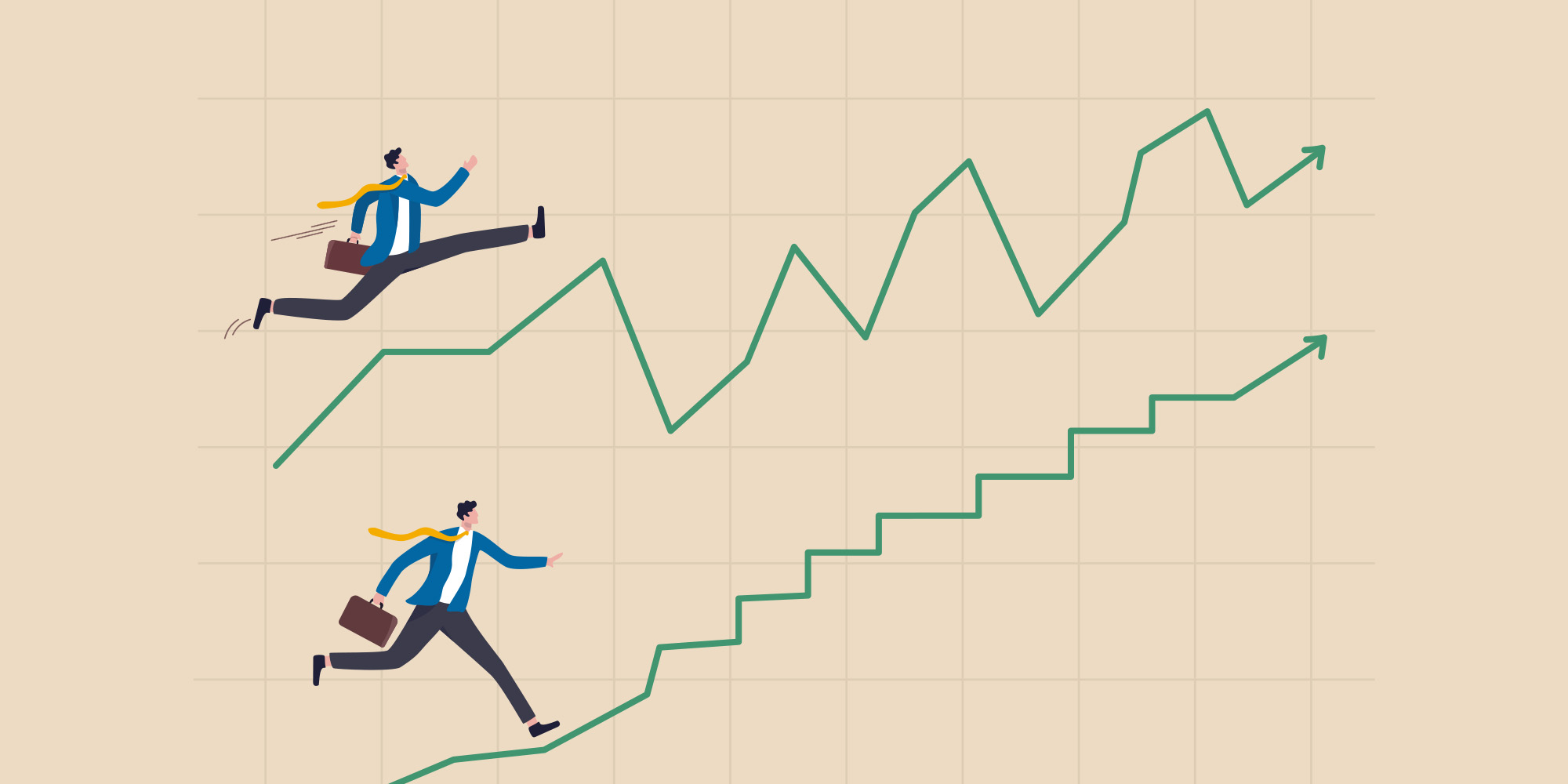Weekly Report 46/2025

Volatility returns
Surprisingly good corporate results kept the markets confident, partly due to the widely predicted interest rate cuts by the US Federal Reserve in the coming quarters. However, volatility returned last week due to high valuations in large parts of the technology sector.
This is because, alongside a few technological stars, there are also many average performers that have benefited from years of fiscal “state doping,” as the accumulation of US debt could also be called. However, clear side effects are increasingly becoming apparent in the form of structurally higher inflation, systematically higher interest rates, and growing fundamental investor skepticism. In addition, more and more investors are hedging their dollar risks, which, however, costs 4.1% annually.
The Nasdaq technology index (-3.0% last week) is still up since the beginning of the year (+5.7% in Swiss francs), while the Dow Jones is clearly down again (-2.0%). The MSCI World ended last week at +4.5% since the beginning of the year. The Swiss Market Index (SMI), on the other hand, is up +6.0%.
In periods of fear, the SMI has repeatedly demonstrated its typical defensive robustness. While all other European stock indices and, above all, North American indices posted negative performances last week, the SMI rose slightly (+0.5%).
Nvidia and BKW (both -7%) fell sharply in the first week of November, while Geberit (+6%), Engie and Roche (both +4%) posted the strongest gains. We hold Berkshire Hathaway (+5%) as a defensive position in some portfolios, a stock that typically gains when tech stocks fall.
Dealing with collective investor fears can be challenging. In a global economy that is growing at a structural rate of around 3%, achieving a real return of 5% per annum (after all costs and fees and inflation) is a success. Those who add conservative bond components to their portfolios will experience less volatility, but will also have to accept lower long-term return targets.
Those who strive for higher real returns inevitably have to take high risks. One example of this would be an investment in the Swiss sporting goods company ON, which is listed in New York. Although the Zurich-based company recently raised its profit expectations, its share price moved in the opposite direction (-36% since the beginning of the year with a 0% dividend). With high valuations, simply growing is no longer enough. Instead, companies must grow enormously – otherwise, their share prices are likely to decline.
However, it is also possible to take a conservative approach to portfolios, as we have done, by limiting the proportion of US and technology stocks. The world doesn’t just need software from Microsoft and streaming services from Netflix. It also needs building materials from Holcim and Amrize, as well as construction chemicals from Sika, to build buildings, roads, and data centers. It needs power generators and grid operators, and much more besides, which, incidentally, are still reasonably valued and yield juicy dividend returns.
Topic of the week: Palantir – an extreme business model

Palantir is a good example of AI-related business model valuations and is considered the AI speculative stock par excellence. The company, which thrives on data networking, owes its revenue primarily to US government contracts related to “espionage.” The largest contract came directly from the White House. Donald Trump issued a decree instructing all ministries and national authorities (health, customs, education, banking, telecommunications, social security, law enforcement, etc.) to share their data on citizens with Palantir software.
This allows all social media profiles, bank data, and cell phones to be tapped. Do-gooders see this as an effective tool for tracking down illegal immigrants, criminals, and terrorists. They see Palantir as the key to improving the world. But it also makes it easier to monitor students and people with health insurance, as well as dissidents, unpopular journalists and comedians, free-thinking university members, demonstrators, and rebellious patriots.
In the Bloomberg classification, it is a company that provides «application software». One could just as easily call the company a new generation arms manufacturer. Secret services in Israel and Ukraine have long been using this software to increase their defense capabilities. «Palantir stands with Israel» was already advertised in a full-page ad in October 2023. However, the largest customer remains the US Department of Defense.
Founder and CEO Alex Karp studied in Frankfurt under philosopher Jürgen Habermas and earned his doctoral thesis in German on «Aggression in the Lifeworld». But in California’s Silicon Valley, he entered a different world. Using artificial intelligence, he began programming software to predict where bombs might be hidden on the roadsides in Afghanistan.
According to his moral compass, a technology company has a duty to support the state. Over the last 12 months, it has generated sales of $4 billion and a profit of $1 billion. And the impressive valuation of the company, which also has numerous IT programmers in Zurich and Geneva, is 400 times its profit. In Europe, however, Palantir’s business is developing slowly. Data protection prevents the analysis of citizens, as is possible in China and the US today.
The most important data points in the new week
| 11 November 2025 | Germany: ZEW Survey Expectations November |
| 12 November 2025 | Japan: PPI & Machine Tool Orders October |
| 13 November 2025 | USA: CPI Core Inflation, Inflation & Average Earnings October |
| 14 November 2025 | USA: Retail Sales & Business Inventories October |
Events
Information event for private individuals – Investing money is also a matter of trust
On Thursday, November 13, 2025, we will be holding an information event for private individuals at our Lüssihof premises. The presentation will be held in Swiss German.
This event is primarily aimed at interested parties who would like to get to know us better.
To registration (in German).
Zugerberg Finanz Economic and Portfolio Outlook – January 2026
The next Zugerberg Finanz Outlook events will take place on Wednesday, January 14, 2026, at the Theater Casino in Zug and on Tuesday, January 20, 2026, at the KKL in Lucerne.
Please make a note of the date. The program and registration details will be available shortly in the events section of our website.
Zugerberg Finanz economics workshops for young people – March 2026
Inspire and motivate young people! On Saturday, March 7, 2026, and Saturday, March 14, 2026, we are hosting two one-day workshops with Maurice Pedergnana and Cyrill von Burg for young people entitled “The Fascination of Economics” and “The Fascination of the Stock Exchange & Capital Markets.”
To registration (in German).
Market data
| Stock markets | since 31/12/2024 | ||
|---|---|---|---|
| SMI | 12'298.4 | +6.0% | |
| SPI | 16'974.6 | +9.7% | |
| DAX € | 23'570.0 | +18.4% | |
| Euro Stoxx 50 € | 5'566.5 | +13.7% | |
| S&P 500 $ | 6'728.8 | +14.4% | |
| Dow Jones $ | 46'987.1 | +10.4% | |
| Nasdaq $ | 23'004.5 | +19.1% | |
| MSCI EM $ | 1'381.6 | +28.5% | |
| MSCI World $ | 4'325.0 | +16.6% | |
| Bond markets | since 31/12/2024 | ||
|---|---|---|---|
| SBI Dom Gov TR | 227.8 | +1.9% | |
| SBI Dom Non-Gov TR | 122.3 | +1.4% | |
| Real estate markets | since 31/12/2024 | ||
|---|---|---|---|
| SXI RE Funds | 581.2 | +6.9% | |
| SXI RE Shares | 4'325.3 | +18.0% | |
| Commodities | since 31/12/2024 | ||
|---|---|---|---|
| Oil (WTI; $/Bbl.) | 59.8 | –16.7% | |
| Gold (CHF/kg) | 103'581.3 | +35.3% | |
| Bitcoin (USD) | 103'837.9 | +10.8% | |
| Currencies | since 31/12/2024 | ||
|---|---|---|---|
| EUR/CHF | 0.9309 | –1.0% | |
| USD/CHF | 0.8052 | –11.3% | |
| EUR/USD | 1.1566 | +11.7% | |
| Short-term interest rates | |||
|---|---|---|---|
| 3-m | 3-m. fcst. | 12-m. fcst. | |
| CHF | -0.04% | 0.2%–0.5% | 0.2%–0.5% |
| EUR | 2.01% | 1.9%–2.1% | 1.7%–1.9% |
| USD | 3.86% | 4.0%–4.4% | 3.4%–3.8% |
| Long-term interest rates | |||
|---|---|---|---|
| 10-years | 3-m. fcst. | 12-m. fcst. | |
| CHF | 0.13% | 0.6%–0.9% | 0.5%–0.7% |
| EUR | 2.66% | 2.8%–3.0% | 2.5%–2.8% |
| USD | 4.10% | 4.3%–4.6% | 3.8%–4.2% |
| Inflation | |||
|---|---|---|---|
| 2024 | 2025P | 2026P | |
| Schweiz | 0.7% | 0.5% | 0.5% |
| Euroraum | 2.2% | 1.8% | 1.8% |
| USA | 2.8% | 2.5% | 2.3% |
| Economy (real GDP) | |||
|---|---|---|---|
| 2024 | 2025P | 2026P | |
| Switzerland | 1.8% | 1.8% | 1.8% |
| Eurozone | 1.5% | 1.6% | 1.7% |
| USA | 2.6% | 1.8% | 2.0% |
| Global | 3.0% | 3.0% | 3.0% |
